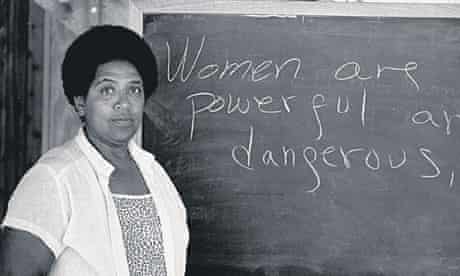slippery positionsPosted in Articles, Gay & Lesbian, Literary/Artistic Criticism, Media Archive, Women on 2013-05-19 03:45Z by Steven |
The State
2013-05-17
Tiana Reid
Columbia University
As a self-defined Black, lesbian, mother, warrior poet, Audre Lorde is the model representative for intersectionality. As such, Sister Outsider: Essays and Speeches has become a ubiquitous text in undergraduate courses, for the theory and practice of intersectionality; a way to look at what women’s studies scholar Leslie McCall calls “the relationships among multiple dimensions and modalities of social relationships and subject formations.” Put crudely, intersectionality is an idea used to explain the links between positions or configurations of oppression. What’s more, as a Caribbean-American (her parents were born in Barbados and Carriacou), we could say Lorde straddled two worlds—or perhaps none at all.
Lorde’s poetry as poetry and not as purely a feminist rubric, however, has been written about far less. In Warrior Poet: A Biography of Audre Lorde, writer and scholar Alexis De Veaux describes the genesis of the poem “Sahara,” published in Lorde’s 1978 book of poems, The Black Unicorn, in a moment while Lorde was on a plane in 1977 that passed over the Sahara desert after making a stop in Madrid to refuel. The poet, flying from New York City, was on her way to Lagos, Nigeria for FESTAC, the Second World African Festival of Arts and Culture. Lorde’s trip to Nigeria is meaningful not simply because the plane ride—the birds-eye view of the vastness of the Sahara—inspired the homonymous poem. By 1977, Nigeria had emerged as what De Veaux calls the “richest black-ruled nation” in Africa because of oil wealth. Bringing together Black activists, academics, writers, artists and spectators, FESTAC acted as a transnational spectacle establishing new political, literary and racial grounds.
What’s most significant here is that despite the literal and symbolic coming together of a black diasporic vision in the name of arts and culture, Lorde stayed on the fringes and felt separate from some sense of a monolithic group identity, an identity based seemingly solely on race—and not gender or sexuality. Lorde’s participation and view on FESTAC is mostly shrouded in mystery but what we do have is the poem “Sahara.” I read “Sahara” through Lorde’s trip to FESTAC and thus, envision landscapes of diaspora as heterogeneous and transformative. Her hesitation toward FESTAC parallels the poem’s fluctuating hesitation toward the Sahara desert. I say hesitation rather than outright fear despite the all-encompassing terror that can be gleaned from Lorde’s approach to the masculine desert: “grief of sand… male sand / terrifying sand.” The hesitation emerges from the heterogeneous incarnations sand is allowed to take. Rocks, what sand is made of, take millions and millions of years to become sand, meaning the image of a desert can’t be separated from its process, from its formation through finely divided particles, a prolonged breaking down…
Read the entire article here.

